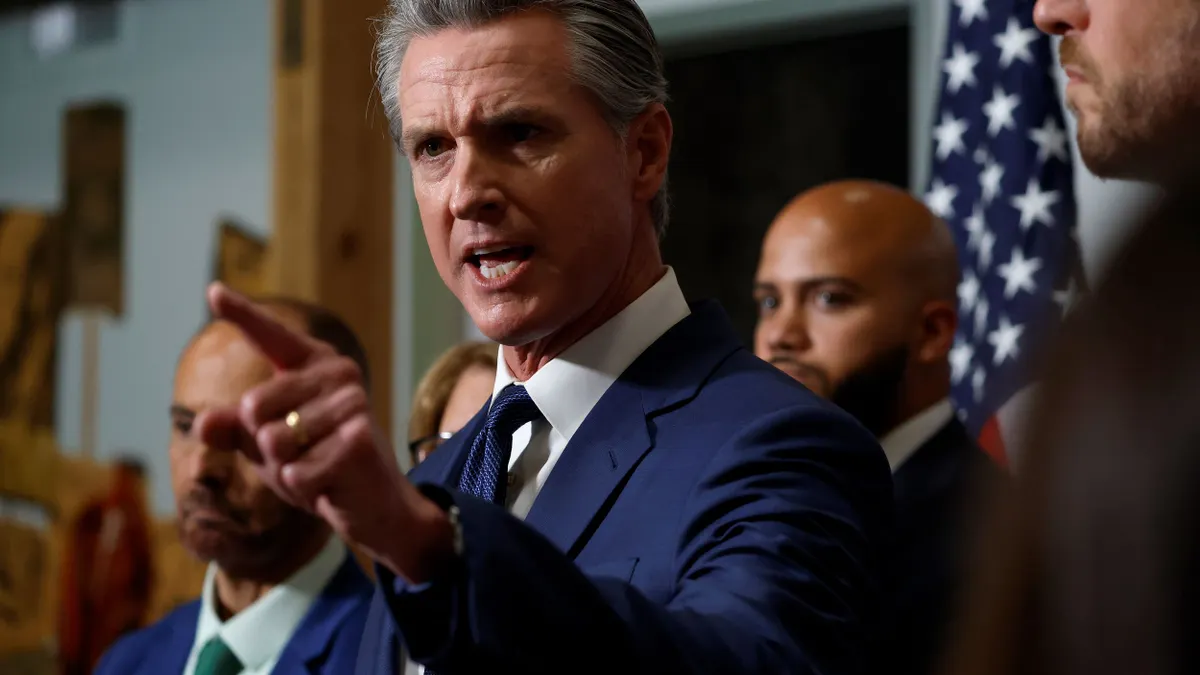Following President Donald Trump’s reelection in November, large U.S. banks began an exodus from the United Nations-aligned Net-Zero Banking Alliance that expanded to U.S. asset managers before rippling beyond the nation’s borders. On Wednesday, NZBA announced its steering committee will hold a vote to reframe its mission and move away from a membership-based model, replacing it with a focus on establishing industry guidance.
NZBA said in the announcement that it will pause all ongoing activities until the vote concludes and results are announced at the end of September, making it the second UN-backed net-zero industry organization to suspend activities this year.
The banking climate alliance, backed by the UN Environment Programme finance initiative, was formed in 2021 with 43 members and at least tripled in size at one point, according to NZBA’s site. The organization’s website no longer contains a membership list or its signatory pledge; both links redirect to NZBA’s main webpage.
Here’s a recap of how the organization got here.
A US rush for the exits
Even prior to Trump’s reelection in November, major U.S. banks and financial institutions had been subject to multiple Republican-led state probes and House Congressional investigations for being members of NZBA and other industry climate alliances. After the 2024 election, with Trump buoyed by Republican control of the House and Senate, six major U.S. banks — including five of the six largest U.S. banks — announced NZBA exits prior to the inauguration.
Goldman Sachs was the first in December of last year, followed by Wells Fargo, Bank of America and Citigroup before the end of the year. Morgan Stanley and JPMorgan Chase left the alliance in early January. All six banks had been targets of separate state probes by Republican state attorneys general and state heads of agriculture. Following the bank exits, Texas Attorney General Ken Paxton ended prior probes into Bank of America, Morgan Stanley, JPMorgan and Wells Fargo.
“Companies don’t want to step in the way of [Trump’s] agenda … they don’t want to jump in front of that freight train,” Arvin Vohra, CEO of energy-as-a-service provider Redaptive, told ESG Dive after the exodus of U.S. banks.
Despite leaving NZBA, the banks have largely maintained their net-zero commitments and goals, with the exception of Wells Fargo — which dropped a 2050 net-zero financed emissions target in March. Another coalition of state attorneys general ended a probe into Wells Fargo shortly after the bank dropped its net-zero target.
The U.S. defections were not contained to banks. BlackRock, the world’s largest asset manager, announced it was exiting the UN-backed Net Zero Asset Managers initiative on Jan. 9, telling clients that the membership was creating confusion around the firm’s practices and making it subject to “legal inquiries from various public officials,” executives said in a reported letter.
NZAM announced an operational pause shortly afterwards on Jan. 13, and Northern Trust Asset Management and J.P. Morgan Asset Management later left the climate alliance. The latter cited the pause as its reason for departing.
Canada was next, then Europe began to follow
Wall Street’s departure from NZBA first rippled north of the U.S. border to Canadian banks. Before the end of January, Canada’s six largest banks also announced their exits from NZBA.
TD Bank, National Bank of Canada, Bank of Montreal, Scotiabank and the Canadian Imperial Bank of Commerce each announced their intent to depart on Jan. 20, coinciding with Trump’s inauguration in the U.S. Canada’s largest bank, the Royal Bank of Canada, departed Jan. 31.
NZBA updated its guidelines for how banks should set climate targets in April, forgoing a prior requirement for members to strictly target limiting global temperature rise to 1.5 degrees Celsius. The group’s updated guidance, instead, required signatories to align targets with limiting warming “to well below 2 [degrees Celsius], striving for 1.5°C.”
On the same day the updated guidance was announced, Netherlands-based Triodos Bank exited the group and explicitly blamed the guidance’s lowered standards for its departure. The bank said in a release that the standards “fall short of the needed urgency to align loans and investments portfolios with the 1.5 degrees Celsius global warming scenario.”
Outside of Triodos’ exit, all of the prior departures had been tightly grouped in time and location around Trump’s election and inauguration. The exodus jumped across the pond in July, after U.K.-based HSBC said it was disassociating from the climate alliance and U.K.-based Barclays also quit the alliance. The departures hopped borders again in early August, when Swiss bank UBS withdrew from the alliance.
“As we look ahead, NZBA remains focused on supporting the many committed banks driving this transformation forward,” an NZBA spokesperson told ESG Dive after UBS’ exit. “The need for bold action from the banking sector has never been greater and NZBA is here to help deliver it.”
Now a vote to reorganize NZBA’s structure
In announcing the vote to move away from a membership-based model, NZBA is addressing a point of contention that Republican state and federal officials have raised in recent years. The officials have alleged that members of NZBA, NZAM and other alliances like Climate Action 100+ have committed antitrust violations through pledges the groups require to orient asset and financed emissions towards net-zero emissions.
NZBA said Wednesday it recognizes there is a “major opportunity for banks and key stakeholders to build on” its work and “encourages the banking sector to remain steadfast in implementing their net-zero commitments.”
“The steering group believes this is the most appropriate model to continue supporting banks across the globe to remain resilient and accelerate the real economy transition in line with the Paris Agreement, as well as to continue engagement with the global banking industry to develop further guidance and tools needed to support them and their clients,” NZBA’s Aug. 27 update said.
Katrin Ganswindt, coal and divestment campaigner for German-based environmental nonprofit Urgewald, had pointed criticism following Wednesday’s announcement and told ESG Dive that “voluntary alliances like NZBA did not deliver.”
“Fossil fuel finance needs effective regulation, which would also improve the financial system's resilience,” Ganswindt said in an emailed statement. “Central banks, bank regulators and oversight agencies should finally step up to the plate. They should start by drawing a clear line at the financing of fossil fuel expansion.”
Before NZBA announced the vote, Trillium Asset Management Director of Shareholder Advocacy Andrea Ranger told ESG Dive that whether the various departures were to avoid the legal risks of potential antitrust allegations by U.S. political entities, “the fact of the matter is that [NZBA] oriented these companies toward a net-zero strategy.”
“Ultimately, what we really want [the banks] to do is actually do the work,” Ranger said in an interview last week. “Whether they’re part of an alliance or not — I think it would be better if there were that collective momentum versus each company doing their own thing — but we just want them to do the work. And if that helped them get there, then that's great.”




















